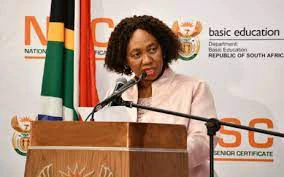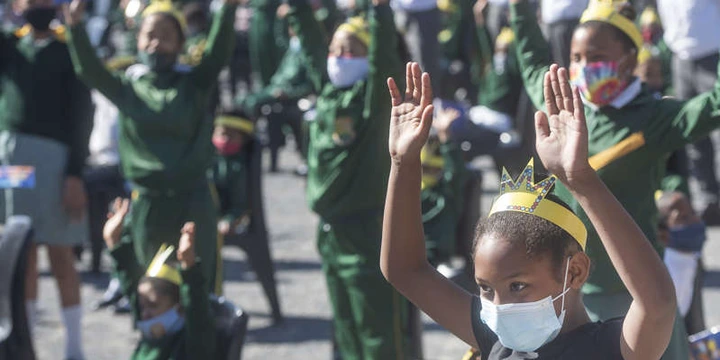Bad news from the education department in South Africa
Bad news from the education department in South Africa
Addressing South Africa’s proficiency emergency isn’t obvious, yet specialists concur that having ‘bums on seats is the initial step.
a person looking at the cell phone
First distributed in the Daily Maverick 168 week after week paper.
“That is the main way we will have the option to pivot what resembles a profound jump off a bluff,” said Professor Sarah Howie, head of the Africa Center for Scholarship at Stellenbosch University.
Nonetheless, this is ending up a test during Covid-19. Pandemic-related terminations of Early Childhood Development (ECD) focuses across South Africa – some transitory and some long-lasting due to monetary battles – would negatively affect student education.
“By passing up participation at ECD focuses, youngsters have lost the early education energy that they would have created. This implies a postponement in their language and understanding capacities,” said Eric Atmore, top of the Center for Early Childhood Development.

Training and proficiency specialists say that school dropout rates could flood in years to come if dire mediations are not set up to recuperate lost learning time. Howie said, nonetheless, that South Africa was in good company, and proficiency mishaps could happen universally due to the pandemic.
As indicated by the 2016 Progress in International Reading Literacy Study (PIRLS), eight out of 10 Grade 4 students can’t peruse for significance across all dialects in South Africa.
The review surveys understanding cognizance and screens patterns in perusing education at five-year spans. In 2016, South Africa set last out of the 50 nations taking an interest in the review.
Howie, who was the public examination organizer of the review, said youngsters who battle to peruse by age 13 were probably going to exit the school.
Grown-up education rates in South Africa are very little better. World Bank information shows the nation has an 87% grown-up education rate, positioning beneath nations like Mexico (95%), Brazil (93%), and Azerbaijan (99.8%). The figure for South Africa addresses a decay of around 7% in two years.
As per Howie, in the direst outcome imaginable, grown-up education rates could plunge to where they were around 40 years prior.
Further developing proficiency reduced to instructor preparing, asset arrangement, and precise appraisal, she said. This implies educators are engaged to precisely check a youngster’s understanding level, give them the right understanding materials and screen their advancement.
Instructors ought to likewise have the option to furnish guardians with the abilities to assist their kids with understanding schoolwork.
Talking at a Unesco World Literacy Day occasion on 6 September, Basic Education Minister Angie Motshekga said that, of her specialization’s 11 needs set to take the essential training area “to a higher level”, guaranteeing students could peruse for significance was the most significant.
She said a few drives had been dispatched, including the Read to Lead Campaign, the National Reading Coalition, the Integrated National Reading Sector Plan, and Presidential Reading Circles.
Arranged results for the flood of intercessions included arriving at a 500-point score for Grade 8 students in the Trends in Mathematics and Science Study by 2030, and further developing South Africa’s Southern and East African Consortium for Monitoring Education Quality outcomes for Grade 6 Languages and Mathematics from 495 to 600 focuses by 2022. Atmore said proficiency was “basic for a youngster’s capacity to learn” as they advanced through the training framework and for “social and enthusiastic working in the public arena”.
The PIRLS investigation discovered that the greater part of South Africa’s elementary schools needed books, libraries, and frameworks, restricting advancement in perusing proficiency for Grade 4 students.
“Library assets are underfunded and they are not generally found near humble communities and towns,” said Howie.
The duty on books had additionally made them excessively expensive. Atmore said an absence of books in devastated homes passed on kids with not many freedoms to peruse outside the homeroom.
High grown-up proficiency rates likewise influenced youngster education. Atmore said the onus on guardians to help with educating and picking up during the Covid-19 pandemic implied that youngsters in homes where guardians were ignorant were most in danger of misfortunes.
During an online class on 8 September facilitated by Stellenbosch University’s School of Education, Professor Mbulungeni Madiba said guardians’ capacity to help their kids with picking up during lockdown may likewise have been hampered by whether the parent was proficient in English, the language most youngsters are instructed in.
PIRLS found that, despite the prerequisite that South Africans be instructed in their home language until Grade 3, students examining in English and Afrikaans had the most elevated perusing accomplishment paying little heed to the language expressed at home.
Educator preparation was another issue, Howie said, as it frequently didn’t occur in the instructor’s home language. “So they may be doing the instructor preparing in English however at that point they need to proceed to educate in Tsonga, for example.”
There was likewise a deficiency of qualified Foundation stage educators in the generally casual ECD area and individuals training kids to peruse were not generally prepared to do as such. DM168
This story originally showed up in our week after week Daily Maverick 168 paper which is accessible for R25 at Pick n Pay, Exclusive Books, and air terminal book shops. For your closest stockist, kindly snap here.
South Africa’s literacy rates plunge deeper as learning time is lost (msn.com)
Content created and supplied by: mandlaj588news (via Opera News )
